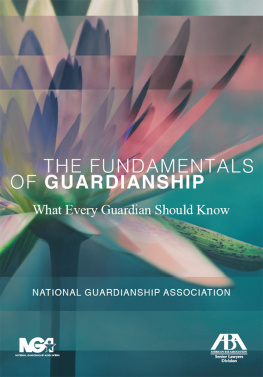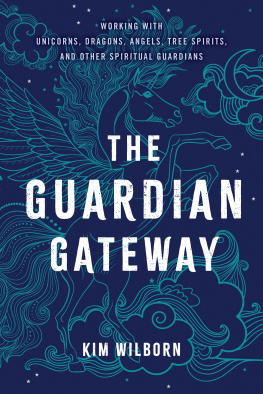THE FUNDAMENTALS
OF GUARDIANSHIP
What Every Guardian Should Know
Cover design by Tahiti Spears/ABA Design
The materials contained herein represent the opinions of the authors and/or the editors, and should not be construed to be the views or opinions of the organizations with whom such persons are associated with, nor of the American Bar Association or the Senior Lawyers Division unless adopted pursuant to the bylaws of the Association.
Nothing contained in this book is to be considered as the rendering of legal advice for specific cases, and readers are responsible for obtaining such advice from their own legal counsel. This book is intended for educational and informational purposes only.
2017 American Bar Association. All rights reserved.
No part of this publication may be reproduced, stored in a retrieval system, or transmitted in any form or by any means, electronic, mechanical, photocopying, recording, or otherwise, without the prior written permission of the publisher. For permission contact the ABA Copyrights & Contracts Department, .
ISBN: 978-1-63425-721-3
e-ISBN: 978-1-63425-722-0
Library of Congress Cataloging-in-Publication Data
Title: Fundamentals of guardianship : what every guardian should know
Description: Chicago : American Bar Association, 2017.
Identifiers: LCCN 2016051227 (print) | LCCN 2016051306 (ebook) | ISBN 9781634257213 (softcover : alk. paper) | ISBN 9781634257220 ()
Subjects: LCSH: Guardian and wardUnited States.
Classification: LCC KF553 .H87 2017 (print) | LCC KF553 (ebook) | DDC 346.7301/8dc23
LC record available at https://lccn.loc.gov/2016051227
Discounts are available for books ordered in bulk. Special consideration is given to state bars, CLE programs, and other bar-related organizations. Inquire at Book Publishing, ABA Publishing, American Bar Association, 321 N. Clark Street, Chicago, Illinois 60654-7598.
www.shopABA.org
CONTENTS
INTRODUCTION
The mission of the National Guardianship Association is to advance the nationally recognized standard of excellence in guardianship.
The vision of the National Guardianship Association is every person will be provided respect, due process, rights, and dignity in guardianship.
Purpose
Although each state has developed its own procedures for initiating and administering guardianships and conservatorships, the National Guardianship Association (NGA) developed this book primarily to provide general information to family, professional, and public guardians and conservators so that they are able to provide services that would meet or exceed all state requirements.
NGA hopes that anyone involved with or interested in the well-being of persons facing or under guardianship will benefit from having access to this concise book describing the fundamental responsibilities of a guardian.
NGA, founded in 1988 as a nonprofit national organization, strives to strengthen the practice of guardianship and related services through networking and education. NGA believes that the practice of guardianship should always be conducted in the most professional and ethical manner and that nationally recognized standards of excellence in guardianship should be encouraged and promoted.
Many NGA members are not guardians, but work in a collateral capacity with guardians. Active members include professional care managers, social workers, attorneys, educators, court administrators, judges, and other community professionals involved in guardianships, but not acting as guardians themselves.
Standards and Ethics
NGA has adopted standards of practice that reflect a high quality of performance in addition to Ethical Principles that address the relationship between a guardian and a person subject to guardianship. The first ten standards were developed in 1991 and expanded in 2000 to twenty-five. Additional revisions were added in 2002, 2007, and again in 2013 to reflect advances in guardianship practices.
Please refer to both the NGA Standards of Practice and the Ethical Principles (both available at www.guardianship.org ) included in this book. Throughout this book are references to the relevant NGA Standards of Practice.
Certification
The Center for Guardianship Certification (CGC) is a nonprofit organization that provides a comprehensive guardianship certification program to encourage, support, and foster best practices for quality guardianship services. The qualifications for the CGCs certification programs are often more stringent than state requirements. Achieving the National Certified Guardian (NCG) credential demonstrates that an individual possesses basic knowledge and understanding of guardianship, its governing ethical principles and practice standards. To obtain CGCs highest credential, National Master Guardian (NMG), a person must meet high qualifications and pass a day-long examination covering more advanced concepts and specialized topics. CGC certification is available in all states for all guardians, with some states requiring either CGC or state certification for specific types of guardians.
Certification alone does not guarantee that the individual will properly perform the duties and responsibilities of a guardian or act in accordance with all state laws. It is, however, NGAs and CGCs mutual goal to ensure that individuals are properly prepared to fulfill their obligations as guardians (Standard ).
Glossary
A tremendous variety of terms are currently in use in the guardianship field. Some are legally defined; many are specific to a particular state. To help the reader understand the terminology used in this book, the authors provide a glossary. The first time a term defined in the glossary is used or discussed in the text it is highlighted in bold .
ACKNOWLEDGMENTS
The first version of the Fundamentals of Guardianship, developed by Greg Mullowney and Francine Saccio, was published by the National Guardianship Association in 2001. In 2004 NGAs Training and Education Committee took this text framework, redesigned the material, added references to the Standards of Practice, and developed resources and a glossary. The dedicated persons on this subcommittee were Chairperson Vickie V. Alkire, Sally Hurme, Beth Upshaw Mathews, and Susan McMahon. In 2014, the NGA Education Committee under the leadership of Chairperson Helen Ferraro-Zaffram and the work of the committee members Ginny Casazza, Lauren Sherman, and Sally Hurme made major revisions to reflect the evolution of guardianship practice and NGAs updated Standards of Practice.
A very special thank you to those who have contributed their valuable time, energy, and expertise to this project over the years.
Guardianship and Its Alternatives
Overview of Guardianship
Each state has developed its own legal criteria and process for determining when an individual is legally incapacitated and, as a result of this incapacity , is unable to make decisions to care for his or her personal matters or property. Depending on state terminology, the court appoints an individual or entity to serve as guardian or conservator . For clarity, because of the various terms used in the states, the term guardianship throughout this book includes the appointment of a surrogate decision maker for either personal or financial matters. A reference to a guardian includes a conservator and all other types of guardians, except where indicated.
It is important to note that the terms disability, incapacity, and incompetence are not intended to be attached to any particular category of people. However, the three major categories of adults who often need to have a guardian appointed are those who lack decision-making capacity due to dementia , those who have an intellectual disability, and those who have a mental illness. Others who may require a guardian are individuals who have a brain injury or physical trauma that causes the individual to have diminished capacity to make decisions or communicate them in a clear manner.











